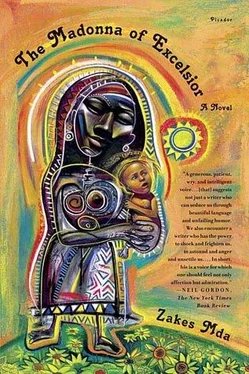But Popi was still pink. They would see that she was of mixed blood.
Niki took the smoking brazier into the shack and placed it on the floor. She held a naked Popi above the fire, smoking the pinkness out of her. Both heat and smoke would surely brown her and no one would say she was a light-skinned child again. The baby whooped, then yelled, as the heat of the brazier roasted her little body and the smoke stung her eyes and nostrils. Cow-dung smoke is gentle in reasonable doses. But this was an overdose. There was so much that it made even Niki’s eyes stream. She assured the baby that it was for her own good. She sang a lullaby as she swung her over the fire. Rocking her from side to side. Turning her round and round so that she would be browned on all sides. Evenly.
FOR FIVE DAYS, they did not come for Niki. The nights became too long to bear, for they were unaccompanied by sleep. Days were tiresome and teary, for she spent them hovering over a smoky brazier, browning her little girl. Singing lullabies and hoping the baby would get used to the heat and would stop crying so. Singing lullabies until the baby became red instead of brown. Until the baby’s skin began to peel from her chest right up to her neck. Until the baby became truly coloured, with red and blue blotches all over.
Just when Niki was beginning to relax, and to brown Popi for shorter and shorter periods, the police pounced on her. Not in the night, but in the glare of the day when the whole world could see. Two police vans stopped outside her shack. Four burly policemen wálked into the house and dragged her out. Her resistance had no effect. Popi dangled from her hand like a raggedy doll.
When Viliki came back from playing in the street the door was ajar, but there was no one at home. There was nothing to eat either. He sat outside, hoping that Niki would return soon. When darkness fell, he began to cry. Then he walked to Mmampe’s home, three streets away. Mmampe’s mother knew immediately what had happened. She gave him sugared water and a chunk of steamed wheat bread.
SHADOWS SHIFTED around, creating space for her to sit on a mat of grey blankets spread on the concrete floor. She could see their dark outlines vaguely. Shadows holding babies. Gurgling babies sitting on their laps. She could hear Popi crying as a warder walked away from the cell with her.
“Bring back my baby!” Niki screamed. “What are they going to do with my baby?”
“Don’t worry, Niki,” one of the shadows said. “They will bring her back. They are taking her to be examined by the Bloemfontein doctor for traces of whiteness.”
It was Maria’s voice. Niki’s eyes were getting accustomed to the dimness. She could see Maria sitting near the toilet bucket, rocking her baby to sleep. The cell was too small for the ten women packed in it. They barely had enough room to sit with their legs outstretched. Niki knew most of them. Those she could not identify she suspected came from other towns. The sex ring had expanded to include women from farms in neighbouring districts such as Brandfort and Clocolan. Even Marquard, a hundred kilometres away.
“Where is Mmampe?” asked Niki.
“They took her to another cell,” said Maria.
Niki learnt that the warders had had to move Mmampe to another cell because the other women were threatening her with grievous bodily harm. They accused her of exposing their activities to the police.
“How do you people know that Mmampe did that?” asked Niki indignantly. “Mmampe would never do anything like that.”
“She did! She did!” shouted the women in unison.
“Read her the newspaper, Susanna,” said Maria to one of the women.
The woman — Niki learnt later that she was a teacher at a farm school — took out a piece of paper from her deep cleavage. It was a cutting from The Friend newspaper. She shifted closer to the toilet bucket where there was better light. She read with histrionic panache:
AFRICAN WOMAN TOLD POLICE ABOUT AFFAIR
The Minister of Justice, Mr P.C. Pelser, said that all kinds of rumours had been doing the rounds in Excelsior for some time before the police took action. As a result of this a police officer from Ladybrand had given instructions to a warrant officer at Excelsior to investigate the matter. On 21 October he had called a Bantu woman, Mmampe Ledimo, to the charge office and had questioned her. She had admitted that she had had relations with a certain White man. She had, however, added that she had not been the only non-White woman who had done this, and had mentioned a number of others. As a result of this information seven Whites and fourteen non-Whites had been arrested.
“I refuse to believe this nonsense!” said Niki, clearly unable to convince herself that she unreservedly disbelieved the report.
“It’s right here in the newspaper in black and white,” a said the farm schoolmistress.
“A newspaper cannot lie,” added Maria.
“The bitch!” cried Niki.
THESE WERE DAYS when sunflower fields lost their yellowness and assumed a deep brownness. Days when the trinity’s palette became warm and sombre. Dominated by siennas and umbers.
Niki and Popi frolicked in the wide-open spaces that the trinity created for all those who loved wide-open spaces. Those who relished big skies that merged with the earth. Eliminating horizons. Making it impossible to determine at which point the earth ended and the sky began. It was a rapturous sight. Popi, truly coloured in red and blue patches, running among the brown sunflowers. Petals wilted and lost their yellowness. Popi naked and unevenly coloured. Not old enough to crawl. Not old enough to toddle. Yet frolicking and running in the brown field. Niki, naked and free, running after her. Popi and Niki gambolling in the field whose wilting colours formed a fading image. Like one big veronica. Until woman and infant merged with Payne’s grey. And became one with it. Disappearing into the trinity’s splashes and becoming part of the compassion they evoked.
No one would ever find them.
The clanking noise of the keys, and the grating sound of the metal bowls of sugarless maize porridge being pushed across the rough concrete floor, did find them. And dragged them protesting out of the splashes. They had not merged strongly enough. Deeply enough. Their guilt-ridden contours had stood out among the innocent strokes. They were found and brought back into the world of fluster and bewilderment. Of catty women and screaming babies.
Niki was living among them in the stuffy cell. Yet she felt isolated and lonely. She faced each one of the seven days in a daze. She saw things happening to her as if she had another life outside of her body. As if they were happening to someone else. As if she was living in someone else’s dream. Someone else’s nightmare. Daymare. Eveningmare. Morningmare. Every-hour-mare.
Whispers buzzed around her like annoying green flies. Whispers of what Stephanus Cronje had done to himself. The coward. He had taken the easy way out, she mused. Leaving her to face the wrath of the law alone. He had shirked his responsibility right from the beginning. What would happen to Tjaart? She chastised herself for thinking of Tjaart when she and Popi had their own troubles to deal with. When she had been separated from her son, Viliki.
The stench of sour milk from lactating breasts also sought and found her. Milk that had soaked into the babies’ unwashed flannel vests. Yellowing garments made of curdled milk. And the vapours that released themselves from the open toilet bucket. And from the bodies of the interned. Lacteal odours took second place to stronger fetidities when the babies decided to release their bowels. Those who had already been potty-trained before their incarceration sat on the bucket, mothers holding them tightly around their little chests so that they would not fall into it. And sink. A baby could drown in the bucket. It got full very quickly, since the women took turns to empty it only once a day — in the morning before breakfast.
Читать дальше












